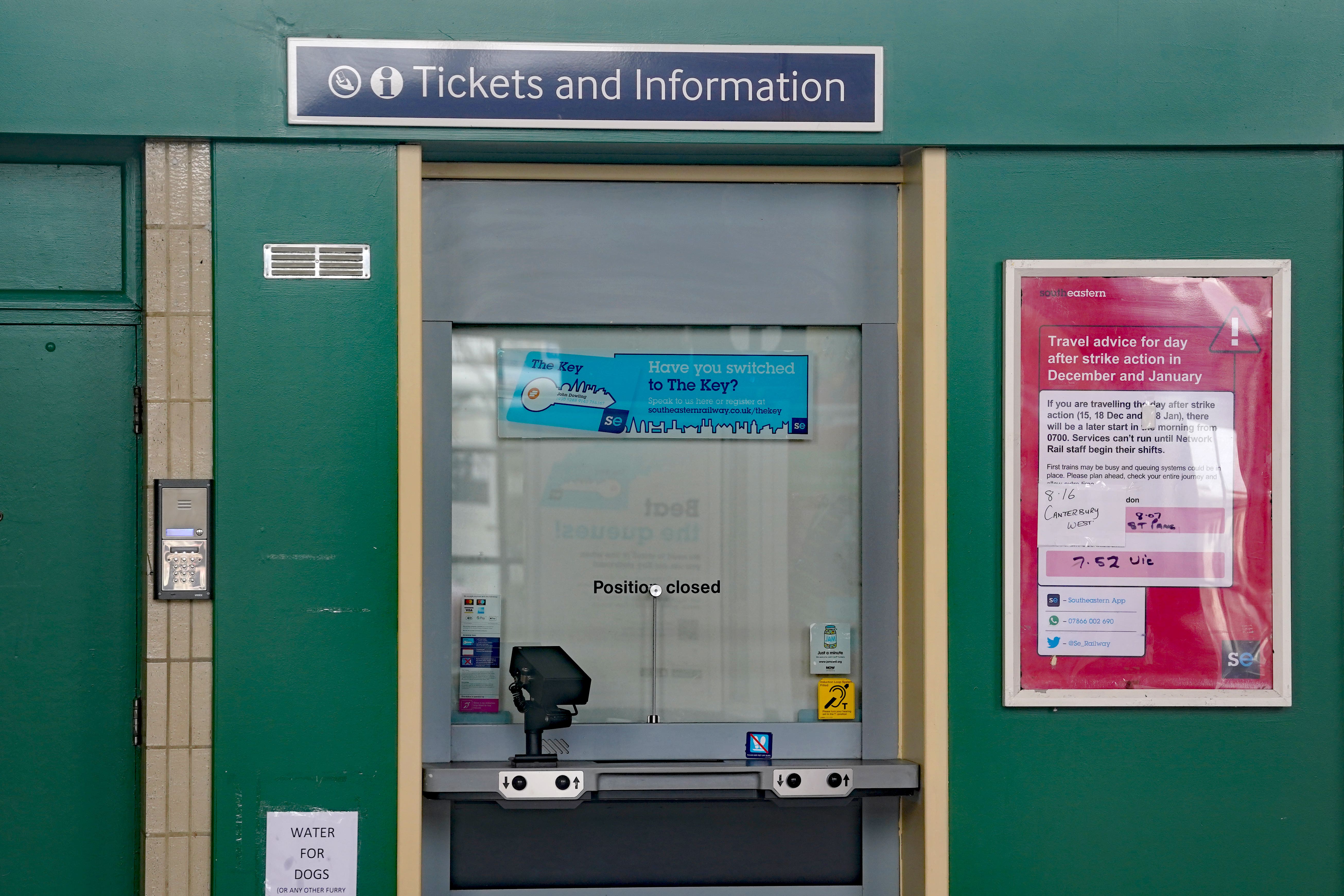Union says ticket office closure plan is ‘a fig leaf for redundancies’
The TSSA said government statements that only 13% of tickets were bought at ticket offices equated to 360 million a year.

Your support helps us to tell the story
From reproductive rights to climate change to Big Tech, The Independent is on the ground when the story is developing. Whether it's investigating the financials of Elon Musk's pro-Trump PAC or producing our latest documentary, 'The A Word', which shines a light on the American women fighting for reproductive rights, we know how important it is to parse out the facts from the messaging.
At such a critical moment in US history, we need reporters on the ground. Your donation allows us to keep sending journalists to speak to both sides of the story.
The Independent is trusted by Americans across the entire political spectrum. And unlike many other quality news outlets, we choose not to lock Americans out of our reporting and analysis with paywalls. We believe quality journalism should be available to everyone, paid for by those who can afford it.
Your support makes all the difference.Plans to close ticket offices are a “fig leaf for redundancies” amid new research showing that millions of travellers use them every year, a union says.
The Transport Salaried Staffs Association said government statements that only 13% of tickets were bought at ticket offices equated to 360 million a year.
The union’s interim general secretary, Peter Pendle, said: “The figures we have uncovered demonstrate that ticket offices are as popular and vital to the railways as ever.
Talk of modernisation is merely a fig leaf for redundancies and what would be a poorer service for the travelling public at large
“Huge numbers of tickets are being bought in this way – something ministers have basically tried to conceal from the public with blatant half truths and deception.
“They talk of 13% as though it were a low figure when in fact it relates to hundreds of millions of rail journeys.
“This goes to show that talk of modernisation is merely a fig leaf for redundancies and what would be a poorer service for the travelling public at large.
“The government’s foolish plans would hit everyone who uses the railways, but most acutely groups such as those with disabilities, limited mobility or young children.
“Clearly, ministers need to change course and keep ticket offices open given the enduring popularity of service they continue to provide.”
Dozens of protests against the closures will be held across the country on Thursday.
The Rail, Maritime and Transport union is taking strike action on July 20,22 and 29 over the closures, as well as pay and conditions.
General secretary Mick Lynch said: “Our union is taking our campaign to save ticket offices out into every town, city and village in this country.
“The recent announcements of ticket office closures is a fig-leaf for the wholescale de-staffing of stations, including safety critical train dispatch, safety critical train despatch staff, passenger assistance and other non-ticket office customer service workers.
“Ticket office closures under Schedule 17 means there will be no regulations on staffing levels at stations whatsoever.
“Train operators will then be free to staff or de-staff any station to whatever level they choose.
“Our union and the travelling public do not want a de-humanised railway that will be a rife with crime and anti-social behaviour, inaccessible to the most vulnerable.
“We will fight these plans all the way and need the public’s support in joining our campaign and taking part in the consultation.”
No station which is currently staffed will be unstaffed as a result of these proposed reforms
The Rail Delivery Group said ticket office staff will be moved onto station concourses as part of measures it believes are necessary to modernise the industry.
A Department for Transport spokesperson said: “These industry-led consultations are about enhancing the role of station workers and getting staff out from behind ticket office screens and into more active, customer-facing roles that will allow them to better support all passengers.
“This is not about cutting jobs – no station which is currently staffed will be unstaffed as a result of these proposed reforms.
“We have been consistently honest about the need for our railways to modernise if they are going to survive. Reviewing the role of ticket offices – with the least busy selling only one ticket an hour – is a crucial part of this.”